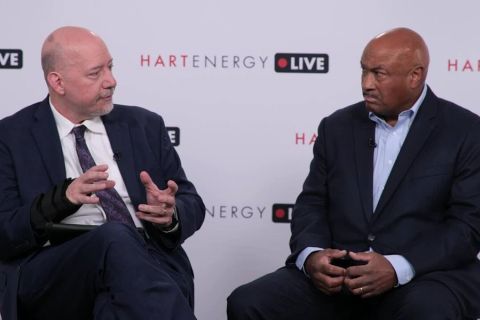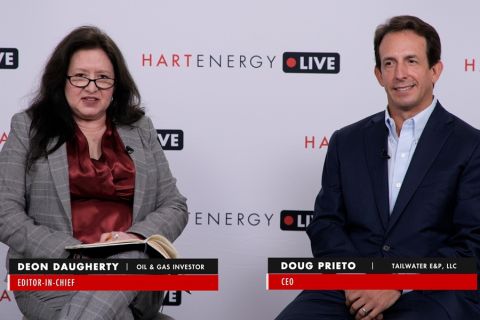
Sidley Austin partner Tim Chandler shares his thoughts on trends in water management mergers and acquisitions. (Source: Hart Energy; CK Foto, zhengzaishuru/Shutterstock.com)
Tim Chandler is a partner in Sidley Austin LLP’s Energy Law practice group where he represents companies, funds and management teams. Among his clients are midstream water supply and pipeline transportation companies. He recently led Sidley’s team representing XRI Holdings LLC, a full-cycle water management and midstream company with fixed infrastructure in the Permian Basin, in its acquisition of Celtic Disposal LLC.
Hart Energy: The Celtic Disposal LLC deal featured a Permian operator with a water subsidiary that sold that unit to a company that specializes in water infrastructure. Is this a synergy for this particular transaction or a model for water company deals going forward?
Tim Chandler: While I cannot speak to the specifics of this transaction, yes, this is a notable trend. Approximately five years ago, there was a significant trend whereby many E&P-focused companies divested of their midstream assets because it did not make sense to them to hold them any longer, given their expertise in E&P, the focus of their investors and other considerations.

At the time, water usage in E&P operations was starting to be significant, but it was still a fairly minor part of the entire E&P effort, so water was not part of these divestiture efforts. In the past five years, both the use of water in E&P operations as well as the production of water as a result of E&P operations have increased considerably. As a result, many E&P companies have been required to devote significant time, effort and expense to manage these activities.
Like five years ago, some of them are starting to realize that it isn’t their highest and best use to continue these activities, so they are divesting these activities to the growing cadre of water-focused companies. Plus, divestiture allows them to raise some money upfront they can use to continue their drilling and other activities.
What is the perception now of water use units by operators? Are they quaint relics of another time when E&Ps wanted to do it all, or is having an in-house team still useful?
I don’t think they are quaint relics. There are still a number of E&P operators that elect to do most of their water activities in-house, given the absolutely crucial nature of both “just-in-time” water delivery and produced water offtake.
However, many E&P companies are realizing that there are competent, well-capitalized water companies that can provide these services more efficiently and often at a better cost. That was not necessarily the case five years ago.
Among U.S. plays, the Permian Basin is in a league of its own. What about the water business in other basins? Does geology mandate discrete water management regions?
Water will almost assuredly remain a basin-by-basin endeavor. In many basins, due to geology and economic factors, water usage remains low, meaning that water can be handled through traditional trucking and other operations.
However, in basins where geology and economics dictate high water usage, you should continue to see a maturing of the water business within that basin, as water companies receive significant investments from well-capitalized private equity and other funds, acquire water rights, develop permanent pipeline systems, and acquire disposal wells. Many of these companies are starting to play in multiple high-water usage basins but are unlikely to integrate across basins due to the exorbitant transportation and other costs involved.
How do you see the A&D and/or merger trend playing out in water management for the rest of this year through 2022?
I believe that we will continue to see more and more water companies grow, consolidate, evolve and mature, such that they look a lot more like infrastructure companies than “guy-with-a-truck” services companies. This growth and maturation will come via consolidation, acquisition of E&P-divested water assets, and organic building and contracting.
Final thoughts?
As I alluded to, I think the most significant thing to watch out for is these water companies becoming infrastructure players rather than service companies.
Traditionally, there were thousands of these water service companies that owned water trucks that went to and fro. However, given the significant growth in the use of water in many basins, many of these companies have become very infrastructure-like, with permanent assets (water rights, pipelines and disposal wells), long-term contracts, and significant long-term commercial relationships with E&P companies. And, as they become infrastructure players, they will have greater access to more permanent capital that will enable them to mature into significant players in the oil and gas industry.
Recommended Reading
Quantum Teams Looking for Acquisitions ‘Off the Beaten Path’
2024-10-14 - Blake Webster, partner at Quantum Capital Group, said the private-equity firm’s portfolio teams are looking to buy from sellers looking for cash buyouts, though not necessarily in the usual places.
Lime Rock CEO: Small, Mid Cap E&Ps Stuck in M&A ‘No Man’s Land’
2024-10-16 - Eric Mullins said that as large-scale M&A players begin to rationalize their purchases, as much as $18 billion in non-core divestments could find homes to asset-hungry acquirers.
Exclusive: How Vital, NOG Aligned Interests Across Multiple Asset Acquisitions
2024-11-06 - Vital Energy CEO Jason Pigott discusses the company’s relationship with Northern Oil and Gas, including transactions across different assets from Forge and Point Energy, and Vital’s priorities going forward, in this Hart Energy Exclusive interview.
Bankers' Outlook for A&D: A Slow Unwinding of Asset Sales
2024-10-09 - Bankers from CrossFirst, Texas Capital, BOK Financial and Comerica say that after a sluggish season of asset level deals, divestitures will come from larger-scale M&A, but it will take time.
Tailwater E&P CEO Details Recent Core Permian Acquisition
2024-10-08 - Tailwater E&P CEO Doug Prieto said the firm put together funding for the deal from institutions, investors and family offices looking for “high quality assets that have durable cash flow.”
Comments
Add new comment
This conversation is moderated according to Hart Energy community rules. Please read the rules before joining the discussion. If you’re experiencing any technical problems, please contact our customer care team.






